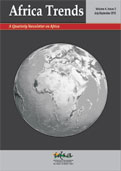The Cycles of Violence That Have Fuelled Burkina Faso’s Insecurity
Burkina Faso, once among Africa’s most peaceful states, has become the world’s most terrorism-impacted country, driven by cyclical violence between jihadists, state forces, and self-defense militias. This paper examines how indiscriminate and ethnically targeted violence, particularly against the Fulani, has fuelled al-Qaeda’s Jama’at Nusrat al-Islam wal-Muslimin (JNIM) expansion. Under Captain Ibrahim Traoré, the Volunteers for the Defense of the Homeland (VDP) have become central to counterterrorism efforts, yet their rapid expansion has coincided with escalating atrocities. The March 2025 “Solenzo massacre” triggered JNIM’s “revenge” campaign, showcasing the group’s capacity to attack and temporarily occupy urban centres. Traoré’s domestically focused but repressive strategy has deepened insecurity, enabling JNIM to advance its governance ambitions. By analysing the role of persecuted communities, militia centrality, and state violence, this study argues that Burkina Faso’s counterproductive tactics have entrenched insurgency and offer critical lessons for regional and international actors confronting extremism in the Sahel and Gulf of Guinea.
- Charlie Werb |
- January-June 2025 |






